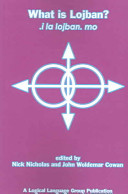Lojban for Experimental Linquistics
Lojban is a predicate language, with no distinct nouns, verbs, or adjectives. What are the linguistic (communicative) properties of such a system? The answer has been partially explored through symbolic logic. But do people, when thinking linguistically, mimic in any way the processes of formal logic? What effects would a formal-logic– based language have on those linguistic thinking processes? Is the resulting language susceptible to the same analysis as natural language, in terms of the various formal systems that have been developed by linguists over the past few decades?
Computational natural language processing usually involves converting natural language to some kind of predicate form, from which deductions can be made; so the usefulness of predicate logic as a tool for such analysis is already accepted. But how does one identify the logical deductions that a human being makes from a natural language statement? By thinking in Lojban, one is already thinking using predicate logic structures, so that the deduction process is much plainer.
Notes:
Natural languages lack the controls necessary for experimentation, but an artificial language works for testing Sapir–Whorf hypothesis.
Folksonomies: language artificial
Taxonomies:
/science/social science/linguistics (0.423948)
/science/mathematics (0.394108)
/science/computer science/artificial intelligence (0.371670)
Keywords:
natural language (0.928304 (positive:0.416891)), predicate logic structures (0.821020 (neutral:0.000000)), linguistic thinking processes (0.775685 (neutral:0.000000)), communicative) properties of such a system? (0.765069 (positive:0.298200)), Experimental Linquistics Natural (0.754530 (neutral:0.000000)), predicate language (0.753133 (negative:-0.211003)), various formal systems (0.716343 (neutral:0.000000)), formal-logic– based language (0.712865 (neutral:0.000000)), natural language statement (0.697002 (positive:0.608886)), Computational natural language (0.696874 (positive:0.250214)), predicate form (0.692846 (positive:0.391573)), distinct nouns (0.622505 (negative:-0.215898)), logical deductions (0.616477 (positive:0.608886)), Sapir–Whorf hypothesis (0.603573 (neutral:0.000000)), Lojban (0.599622 (negative:-0.211003)), artificial language (0.596637 (neutral:0.000000)), symbolic logic (0.582575 (neutral:0.000000)), formal logic (0.580928 (neutral:0.000000)), deduction process (0.573420 (neutral:0.000000)), past few decades (0.571974 (neutral:0.000000)), analysis (0.453502 (positive:0.394874)), experimentation (0.446141 (neutral:0.000000)), verbs (0.446122 (neutral:0.000000)), linguists (0.443260 (neutral:0.000000)), usefulness (0.442097 (positive:0.394874)), lack (0.442090 (neutral:0.000000)), controls (0.432748 (neutral:0.000000)), answer (0.431987 (neutral:0.000000)), adjectives. (0.430395 (neutral:0.000000)), kind (0.429414 (positive:0.391573))
Entities:
natural language:FieldTerminology (0.957702 (positive:0.416891)), Lojban:Person (0.577112 (negative:-0.211003)), Experimental Linquistics Natural:PrintMedia (0.373677 (neutral:0.000000))
Concepts:
Logic (0.948568): dbpedia | freebase | opencyc
Linguistics (0.901555): dbpedia | freebase | opencyc
Natural language (0.793681): dbpedia | freebase | opencyc
Language (0.677246): dbpedia | freebase | opencyc
Natural language processing (0.611317): dbpedia | freebase | opencyc
Syntax (0.585444): dbpedia | freebase | opencyc
Grammar (0.535588): dbpedia | freebase
Formal language (0.533575): dbpedia | freebase | opencyc





